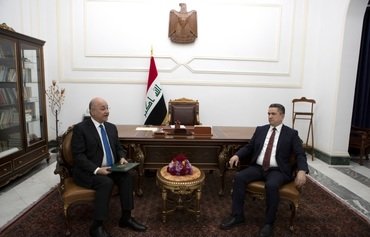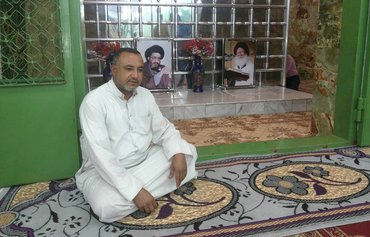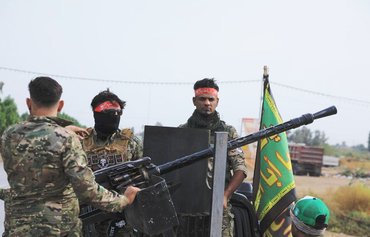The rise of al-Fateh Alliance, a political coalition led by Iran-aligned Hadi al-Amiri, is causing concern among the Iraqi public, who fear that increased Iranian hegemony will threaten Iraq's sovereignty, officials told Diyaruna.
"We have real concerns about a much increased Iranian influence on Iraq's political affairs in the near future," said political analyst Adel Ashram Bin Ammar, who heads the Shamar Tribe Scholars Association in Iraq.
"What is worrying is that the Iranians will try to dominate the political scene in Iraq more strongly than before, and expand their influence through al-Fateh Alliance," he told Diyaruna.
The alliance, established ahead of the April 12th parliamentary elections, includes parties and Iran-aligned militias with a long history of backing an Iranian agenda, he said.
These include Badr Organisation, which al-Amiri has led for many years, and the Asaib Ahl al-Haq, Iraqi Hizbullah Brigades and Imam Ali Brigades militias.
The new coalition won 48 seats in the new Iraqi parliament.
"Iran pushed al-Fateh Alliance to rise and gain political weight, to be used later as a pressure tool on the rest of the parties participating in the political process," Bin Ammar said.
This will allow Iran to "control Iraq's national policies, strategic directions and foreign relations", he said.
Increasing Iranian interference
"Iran's intervention in Iraq's internal affairs was already present and clear to all," Bin Ammar said, noting that this involvement has "increased in the past few years, under the guise of fighting terrorism".
"Today we are not talking about mere interventions and pressures increasing or decreasing in pace, but about political forces that openly declare their allegiance to Iran and have an armed and uncontrolled presence on the street," he said.
According to Bin Ammar, these forces are capable of "provoking chaos and conflict and threatening the structure and security of society".
"By arming militias and supporting political parties loyal to it, Iran seeks to marginalise and weaken Iraq's sovereignty," he said.
It seeks to turn Iraq into a country without regional or international influence that suffers from difficulties that hinder its stability and prosperity, he added.
Iran's actions stir anger among the Iraqi people, "who want their leaders to save the country from Iran's domination, and for the country's decisions and public policies to stem from the interest of the homeland and the citizens", he said.
Challenge for Iraqi government
The current political situation in Iraq has produced "several forces fully loyal to Iran", Ninawa tribal spokesman Sheikh Muzahim al-Huweit told Diyaruna.
This is concerning to Iraqis, "because we have suffered much in recent years from problems that have almost undermined civil peace and the cohesion of the country", he said.
Iran has been attempting to impose its will by force and to direct Iraq's political scene so as to serve its own expansionist objectives in the region, he said.
The new Iraqi government must now decide whether to rid Iraq of Iran's hegemony and advocate for the interests of the Iraqi people, or acquiesce to the Iranian influence and agenda, al-Huweit said.
The latter course of action would "run the country into a dark tunnel and lose the support of the people", he said.
"Iraqi militias and political forces supported by Iran will undoubtedly try to influence matters, but we hope the new government will shed all pressures and work to serve the Iraqi people under a national vision," he added.
Iran-backed politicians a concern
Maj. Gen. Qassem Soleimani, who commands the Quds Force of Iran's Islamic Revolutionary Guard Corps (IRGC-QF), has been able to gather many entities under al-Fateh Alliance, said strategic and military analyst Rabie al-Jawary.
"The presence of Iranian-backed Iraqi figures in the political arena is a dangerous indicator," he told Diyaruna.
These figures are "completely detached from the Iraqi people's aspirations", he added, noting that they only seek to consolidate Iran's influence.
"We believe this is a source of great concern for the future of Iraq, its sovereignty, its people's wealth, and the country's foreign policy," he added.
Iraq's foreign policy "must be based on the principle of respecting other countries and non-interference in their affairs", al-Jawary said.
Sectarian groups and militias in Iraq have gained a political cover and presence, he said, which may pull the country backwards by reigniting regional conflicts and in turn fostering the rise of extremist groups.

![Al-Fateh Alliance leader Hadi al-Amiri speaks at a celebration commemorating the 37th anniversary of the Iran-allied Badr Organisation. [Photo circulated on social media]](/cnmi_di/images/2018/11/02/15142-Iraq-Fateh-alliance-600_384.jpg)






